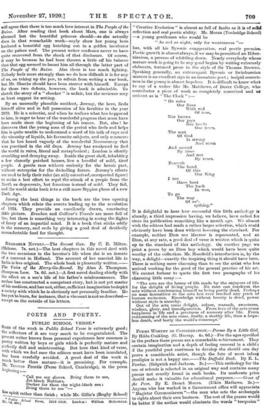POETS AND POETRY.
PUBLIC SCHOOL VERSE.*
&arc of the work in Public School Verse is extremely good ; the collectors of it are very much to be congratulated. The Present writer knows from personal experiences how common is Poetry written by boys or girls which is perfectly mature and Perfectly dull and uninteresting. But here that kind of verse, With which we feel sure the editors must have been inundated, has been carefully avoided. A great deal of the work is much better than mature—it is promising. For example, hr. Terence Preiatis Weise School, Cambridge), in the poem l'aghluing " Call me my slaves. Bring them to me, Jet-black Nubians,
Darker far than the night-black sea Bring them to me "—
has spirit rather than finish ; while Mr. Giffie's (Rugby School) 13. 11.3Sebeei Verse, 1919-1920. Leaden: WIllaaa Heineman, "Creative Evolution" is almost as full of faults as it is of solid reflection and real poetic ability. Mr. Moran (Tonbridge School) —a young gentleman who would be
" As sad as night, only for wantonness "-
has, with all his Byronic exaggeration, real poetic promise. Poetic growth is almost always, if we may be permitted an Iliber- nianiam, a process of whittling down. Nearly everybody whose mature work is going to be any good begins by writing extremely elaborate, tortured prose ha the style of Sir Thomas Browne. Speaking generally, an extravagant Byronic or Sivinburnian manner is an excellent sign in an immature poet ; insipid correct- ness in the young is almost hopeless. It is difficult to know what to say of a writer like Mr. Matthews, of Dover College, who- contributes a piece of work as completely conceived and as reticent as is" The Clock" :— "He rules
Our lives With rod Of iron, Nor knows Our joys Nor heeds Our fears.
The sent Of God Is strong
And stern And moved
By time And not By tears.
Beneath The hand Of this Our King I too Have bent Tho back In woo,
To go
The way Of ev'- rything."
It is delightful to hear how successful this little anthology is already, a third impression having, we believe, been called for since its publication something like a month ago. We almost wish the editors had made a rather larger selection, which could obviously have been done without lowering the standard. For example, neither Eton nor Harrow is represented, and at Eton, at any rate, a good deal of verse is written which is quito up to the standard of this anthology. On another page we print a poem by an Eton boy which would have been quite worthy of the colleation. Mr. Masefield's introduction is, by the way, a delight—exactly the inspiring thing it should have been. There is nothing more charming than to see the artist who has arrived working for the good of the general practice of his art. We cannot forbear to quote the first two paragraphs of his charming little essay "The arts are the honey of life made by the enjoyers of lifo for the delight of living people. No man can condemn the arts without condemning himself as being partly dead, Perhaps no man insensitive to the arts has ever reached any pitch of human eminence. Knowledge without beauty is dead, power without style is anarchy. Out of the arts come delight, colour, warmth, sweetness, wisdom, glory, and transfiguration. From love of the arts come happiness in life and a greatness of memory after life. From contemning of the arts come, firstly, a shabby life, then a hope- less death, and lastly the world's contempt."






































 Previous page
Previous page